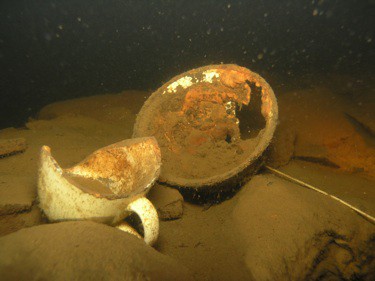How (Not) to Make Natural Dish Detergent

When I moved into my current apartment, I was told it had a dishwasher. Actually what it has is a machine that uses water and a tremendous amount of noise to take bits of food from one dish, swirl them all around, and stick them onto other dishes. This may have to do with detergent companies removing phosphates from their formulas; I’ve tried several different brands, and none seems to work. A maintenance guy even once told me the problem was that, paradoxically, I was using too much soap, which may have been clogging the pipes.
So when a friend linked me to a recipe for homemade dish detergent, I was psyched. Here, at last, was the solution to my problems — and it was cheap and environmentally friendly! Here is that recipe:
– 1 cup Borax
— 1 cup washing soda
— 1/2 cup citric acid
— 1/2 cup kosher salt
Mix it all together, and put one tablespoon in your detergent compartment as you would any other detergent. Use white vinegar instead of Jet-Dry in the rinse-agent compartment. (The washing soda you can probably find at your local supermarket, but save yourself the trip to various health and restaurant supply stores and just order the citric acid online. It’s cheap.)
And here is how that recipe worked out for me.
Attempt 1: I didn’t want to make a full batch to start with, so I scaled the recipe down to one tablespoon’s worth: 1 teaspoon Borax, 1 teaspoon washing soda, 1/2 teaspoon citric acid, and 1/2 teaspoon salt. I poured that tablespoon in the detergent compartment and white vinegar in the rinse-agent compartment.
The result: My food-bit-transference machine had transferred even more bits of food than usual! What a hard worker! My dishes were unusably dirty.
Attempt 2: Hypothesizing that my dishwasher might require more detergent than average, I used a double dose: 2 teaspoons Borax, 2 teaspoons washing soda, 1 teaspoon citric acid, and 1 teaspoon salt. I put one tablespoon in the detergent compartment and one in that little uncovered depression thing next to it. And, of course, I added white vinegar to the rinse-agent compartment.
The result: The dishes were cleaner than they were after the first attempt, but still dirtier than with regular detergent. On top of that, the whole kitchen smelled like white vinegar.
Now, when people on the Internet find out that I wash my hair with baking soda and vinegar, they immediately suspect that I smell like vinegar but simply don’t notice because I’m used to it by now. Well, let me tell you a fun thing, which is that you don’t get used to the smell of vinegar very easily. I know because, for weeks now, my kitchen has been filled with its scent, like a balloon at the foulest birthday party of the most disgusting child.
Attempt 3: I was about to abandon the experiment when I realized that the recipe called for kosher salt, and I had been using regular old iodized table salt. Kosher salt is coarser than table salt and uses yellow prussiate of soda as an anticaking agent instead of calcium silicate. It seemed like those two factors might be the key to finally transferring my food bits down the drain. So I used one tablespoon’s worth of the detergent, this time with the correct salt, and the requisite white vinegar as rinse agent because I apparently lack the capacity to learn from past events.
The result: Not only were the dishes still dirty, but the bottom of the dishwasher was covered in what appeared to be coffee grounds. I assume they must have gotten there from the garbage disposal, but their presence raises a number of questions, such as:
– How?
– Why?
– Did someone seriously design the pipes in this kitchen so that literal garbage could be used to wash my dishes?
– Did the kosher salt exert some sort of summoning power on the coffee grounds?
– Is this like a witchcraft thing/Am I a witch/Am I finally going to get my Hogwarts letter?
In conclusion, my dishes are filthy, and my kitchen smells rank. This homemade dish detergent could not have failed more spectacularly. But I know some of y’all are incorrigible dirty hippies and are going to try this anyway, so I will just say that you don’t have to spend a lot of money on it, and if you have a dishwasher instead of a food-bit-whirler, it might actually work out.
Previously: A Guide to Natural Sleep Aids.
Lauren O’Neal is about to move from Austin to San Francisco. Her new apartment will have no dishwasher, but it may still smell like vinegar. You can follow her on Twitter @LaurenEONeal.